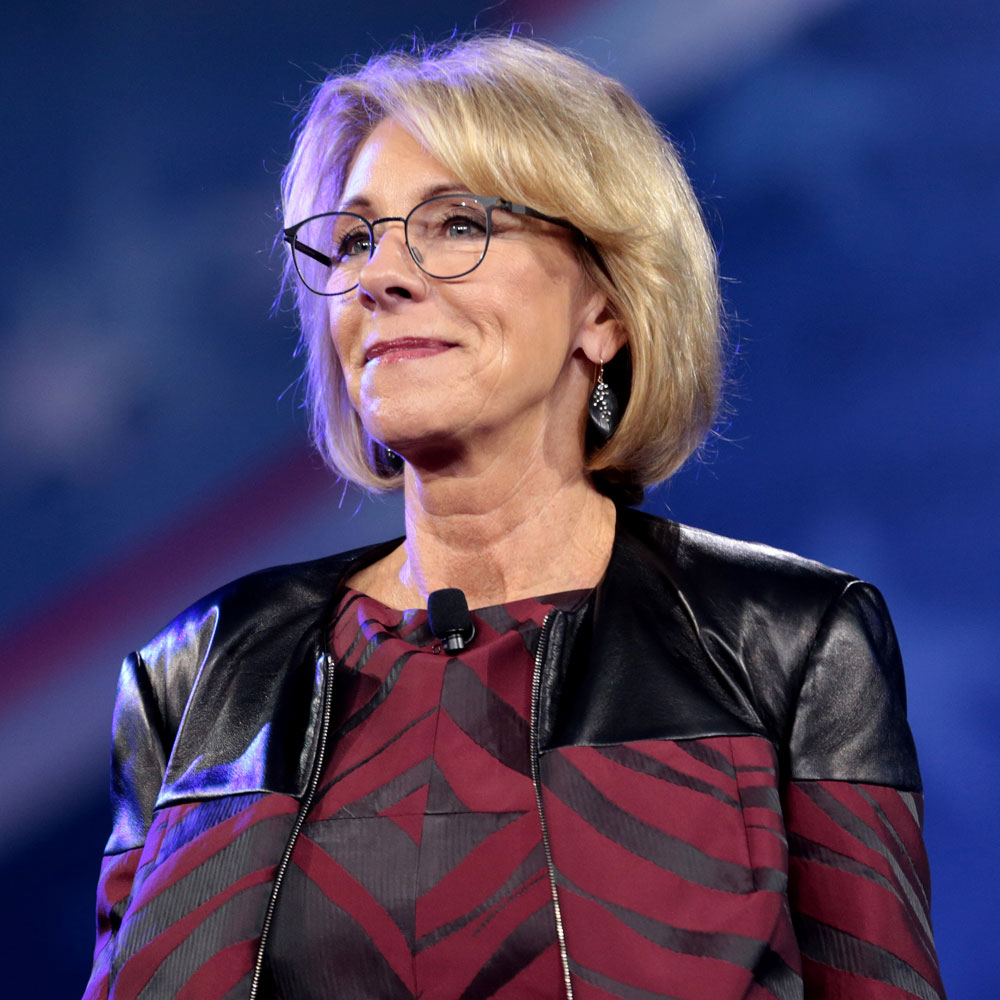
May 15, 2020, New York Times and the Portland Press Herald
US Education Secretary Betsy DeVos has published guidance that circumvents the wishes of Congress on the portion of the CARES Act that was to have flowed to schools. The intent of Congress was to have the money flow in such a way that it went to students with the most need. It did not exclude private schools, but it was to have flowed in a way that was based on the enrollment of low-income students.
The guidance from the Department of Education continues DeVos’s clear preference for private education over public education. Congress has resisted DeVos programs that looked like vouchers for private school attendance. And at the end of 2019, Randi Weingarten, president of American Federation of Teachers, commented, “Here you have someone whose job it is to help students, 90 percent of whom go to public schools in America, and to help students in higher education navigate through their student debt or try to mitigate it. She’s failed on both accounts. Instead, she’s tried to defund and dismantle public education and make it harder for us to help kids in public education.”
Federal dollars have now been directed to even wealthy private schools. A reported $180 million went to individual states to supply “microgrants” to parents of K–12 students, regardless of income, who can use it to pay for tuition for private schools.
Maine is the latest state to refuse the DeVos guidance, joining Indiana and Pennsylvania. “As required by the CARES Act, the funds and services target our most disadvantaged students, regardless of whether they attend public or private schools,” Maine Education Commissioner Pender Makin. Makin says the language in the CARES Act is legal and binding, while the language in the federal guidance is not binding.
Indiana’s superintendent of public instruction, Jennifer McCormick, a Republican, said the state will make sure “the funds are distributed according to congressional intent and a plain reading of the law.” “I will not play political agenda games with COVID relief funds,” McCormick said on Twitter.
US Senator and Minority Leader Chuck Schumer (D-NY) alleged in a speech on the Senate floor that Ms. DeVos was “exploiting congressional relief efforts.” He said she had been “using a portion of that funding not to help states or localities cope with the crisis, but to augment her push for voucher-like programs, a prior initiative that has nothing to do with COVID-19.”
The stimulus bill that passed the House last week includes language that would put restrictions on the possible additional funding, specifically covering private schools. Meanwhile, larger cities that serve the neediest of children are predicting shortfalls of up to 25 percent because the tax base has taken a hit, according to the Council of the Great City Schools, which represents 76 large urban school districts. They project layoffs of over a quarter-million teachers.
Sign up for our free newsletters
Subscribe to NPQ's newsletters to have our top stories delivered directly to your inbox.
By signing up, you agree to our privacy policy and terms of use, and to receive messages from NPQ and our partners.
On the higher education side, DeVos education spending has provided CARES Act funding to small colleges, including private and religious, regardless of apparent need. There are 85 pages of colleges and universities with their assigned allotment, including the American Massage and Bodywork Institute for $151,958. Not all of the institutions have applied for the allotment; some are not yet aware that they are on the list. The coronavirus relief law directs $350 million specifically to “significant unmet needs related to expenses associated with coronavirus.” The Department of Education was to prioritize those schools that did not obtain at least $500,000 from other funding but DeVos provided $500,000 to each small college.
A statement from the Dep’t. of Education said that every teacher and student has been affected by COVID-19. “The current disruption to our education system has reaffirmed what Secretary DeVos has been saying for years: We need to rethink education for all students, of every age, no matter the type of school setting.”
It went on to say that if only poor students were included, “They would be placing nonpublic school students and teachers at a disadvantage that Congress did not intend.”
DeVos has announced a competition for millions of federal dollars to create statewide virtual schools or offer the “microgrants” that are said to mirror voucher programs. The competition could benefit the companies that provide the virtual education systems in which DeVos has invested.
The chairman of the House Education Committee, Virginia Rep. Robert C. Scott, says the competition’s point system favors areas less affected by the pandemic. “This program design is indistinguishable from a standard voucher scheme, and is the latest attempt by this department to promote privatization initiatives against both the wishes of the American people, and the intent of Congress,” he wrote.
God’s Bible School and College of Ohio is on the allocation list to receive funding. The vice president of academic affairs, Aaron D. Profitt, said the school did not plan to claim its allotment. They have been receiving small donations from other sources.
“Of course, when you get a letter from the Department of Education giving you money, you start thinking about all the good things you can do,” Profitt says. “But when I read the CARES Act, the intention was not to do all the good things you could do but try to meet needs. We are trying to cooperate with the law as written.”
Perhaps the Dept. of Education should follow the advice of Profitt and keep to the law as written.—Marian Conway












